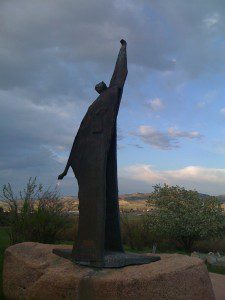 In a Facebook post a week ago, a friend asked, “What happens after a “mountain top” spiritual experience?” The question got me thinking, because most of us are find ourselves in that position from time to time, however we might define that “mountain top.”
In a Facebook post a week ago, a friend asked, “What happens after a “mountain top” spiritual experience?” The question got me thinking, because most of us are find ourselves in that position from time to time, however we might define that “mountain top.”
Understandably, one of his friends simply replied, “Reality,” and I think that we all got a good laugh out of her terse observation. But, of course, that’s precisely the issue. What happens when we come rolling back down hill?
Here are some thoughts on the subject:
Spiritual highs of this kind depend a good deal on the way that we understand them and their role in our lives.
If we think that they are necessary or normative and / or we think of them primarily as a gift to us as individuals, then those assumptions push us in one direction. Most of the results aren’t really helpful.
Growing up in the influence of the southern Holiness movement in the Methodist Church, altar calls were a regular feature of worship. The people who saw mountain top experiences as personally normative or necessary lived and died on maintaining an emotional high. Endless trips to the altar rail, tearful confession, and fresh revelation became the staple of some peoples’ lives.
As an early mentor pointed out to me, that kind of spirituality is untenable. Our emotions are subject to an endless number of influences: physical, environmental, social, intellectual, and experiential changes can all shape the way that we feel. Measuring our spiritual well being against an emotional high place is, by definition, untenable.
To think of “mountain top” experiences in this way also makes us more dependent on the experience, than on God; it feeds a “manic” search for more of them; and ultimately it fosters narcissism.
A more helpful way to think of mountaintop experiences is to think of them as cairns, or places of remembrance, meant to strengthen us in our journey into meaningful connection with God and with others. While we can’t live from spiritual high to spiritual high, it is also unhealthy to hold them at arm’s length.
Moments of spiritual intimacy with God are a source of spiritual solace that makes us available to God’s purposes. They are a reminder of the reality of that relationship and a natural part of the journey into God.
The important spiritual work after a mountaintop experience, then, is to worry less about what happens next, and more a matter of prayerful reflection on its possible significance for the journey ahead. Strengthened by both the reality and the gift in such moments, we find ourselves freed to live in deeper love and connection with God and with others. If we are attentive, we also find ourselves asking God to tell us what the gift of that experience might say to us about the next steps on the journey ahead.
That is the path – through emotional highs and lows — that leads to spiritual maturity.












